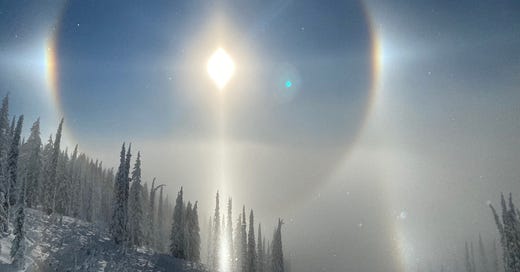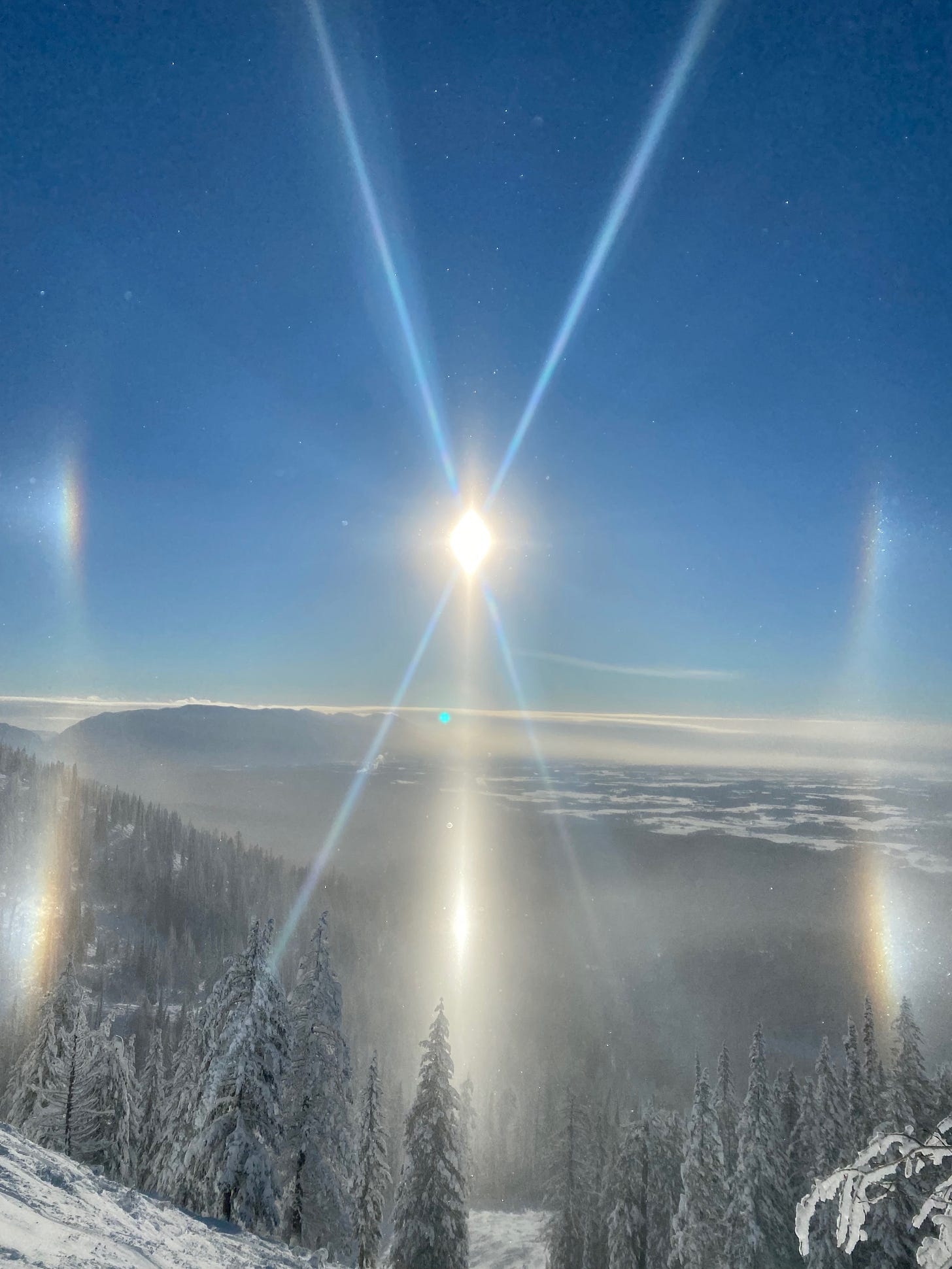“Ah, ah beats our lungs and we are racing into the waves.
Though there are worlds below us and above us, we are straight ahead.”
—from “Ah, Ah,” by Joy Harjo
I kept trying to write a post about hope and then I couldn’t write about hope because I’m not a hopeful sort of person but also try to avoid the pit of hopelessness because there be dragons there, and not the justice-seeking young dragons in Wings of Fire but the Smaug kind of dragons that want to eat your ponies.
There are these two quotes that chase each other around in my head on a regular basis: “Hope is a longing for a future condition over which we have no agency,” and “We are exploring the deep ethics of optimism.” Somehow, in whatever world my mind lives in, it in some way believes both. They fail to cancel each other out even though it feels like they should. I run into people’s hopelessness all the time these days, and sympathize because I feel it, too, and yet . . .
. . . which is why I keep looking for new words, fuller words, revitalized words. Re-storyfied words, and worlds.
—-
Pictured above is a sun halo, an effect created by the refraction of light through ice crystals. (A fuller explanation of these, along with light pillars, was given recently by Mike Sowden in his very fun and informative Everything Is Amazing newsletter and accompanying Twitter thread.) The first time I saw one was five or six years ago in almost the exact same location, though that one was even larger and more distinct. I can still feel the cold weather and ice in my face as I stood staring at it, thinking what my reaction would have been to this phenomenon several hundred or thousand years ago. It was so enormous, and even knowing I could go home and search online for a scientific explanation, I couldn’t shake the feeling of some kind of celestial act, something aware of me, coming for me.
It wasn’t, though. It was just there, the light and my eyes and the ice in the air telling my mind that something other-worldly hovered above. Terrifying. Glorious.
—-
I recently listened to an interview with Pat McCabe, a Diné writer and activist, on the What Could Possibly Go Right? podcast that reminded me that I find hope, and much more, in thinking that shifts my perspective. Talking about the recent year’s social justice stories, she said that there was a phenomenon of “co-witnessing” she’s been noticing—a shared seeing of acts that were once hidden or more easily denied: “There’s something about this co-witnessing that is retelling the stories for us. . . . giving us impetus to take bigger risks in relationship, bigger risks in generosity.”
On the same podcast a year earlier, Sherrie Mitchell posited a question for the listeners that seems fitting to walk into this year with: “Whatever it was that kept you from waking up until that moment—you had lived your whole life in a world where these things were going on all around you, and you had not been able to see them until that moment of awakening—so what was it up until that moment that prevented you from waking up? Because that’s where our work exists.”
Life is full of sorrow; life is full of joy. With hope or without, we can always work to create something better.
Bonus photo: Same day, same sun halo, with a light pillar and sundogs, from a different part of the mountain. I cannot get over how incredible these are. Photos don’t really do justice.
—-
Some stuff to read, listen to, or watch:
When posting the recent walking composition on crows, I forgot to include “A Murder of Crows,” a beautiful personal essay by an old friend, Mary Petiet, on crows, loss, and one of the best cats I’ve ever known (and my life has known many, many cats): “There is something to the ancient idea that information can travel on the currents of energy circling the world to manifest in subtle, easy to miss hints. Everything is connected and everything holds a space.”
From the Grand Canyon Trust, “The Voices of the Grand Canyon,” a website dedicated to re-storying the Grand Canyon area with the histories and connections of Native societies that have lived there “since time immemorial.”
Olga Dobridova writing in MIT Technology Review on Russia’s decades-long history of destroying the Volga River: “The technocratic, goal-oriented thinking of the time had no patience for polite objections from scientists or anything that could interfere with industrial development.” (This report is part of the Review’s current issue on water, and every article in it looks fascinating. But you need to be a subscriber to read all of them.)
Henry Wismayer in Aeon addresses the quandary of travel and travel writing, a subject I grapple with privately a great deal, having been devoted to both for much of the early 2000s and in recent years finding myself increasingly unattracted to it (though Colin Thubron can still draw me in): “For while I balked at ‘influencer’ superficiality, I also appreciated that my travel writing was just a more sophisticated version of the same tendency. I wondered how many other people might have been using travel in a similar, medicinal way – to curate a narrative, sometimes at the expense of subjective joy.”
Maia Silber writing in Psyche on what the early-1900s debate between Walter Lippmann and Upton Sinclair tells us about how ownership of media shapes our accepted societal, political, and economic narratives: “But Sinclair also got something that Lippmann didn’t want to admit: the agendas of a few men did shape the operations of complex organisations, if imperfectly, indirectly, and with inconsistent results.”
From Dark ‘N’ Light magazine, “Dance with Gravity,” a video honoring the Shena Board, an ancient Persian warrior training tool, and its modern iteration in the Earth Board. An article explaining some of the myths and legends in the video accompanies it.
In Locus, Cory Doctorow articulates one of the reasons I enjoy science fiction so much (but didn’t realize it): it’s an inherently Luddite genre—seeking to determine what technology is for (usually, to serve power/capital, vs. serving humanity, which was also the Luddites’ main focus). “The Luddites did what every science fiction writer does: they took a technology and imagined all the different ways it could be used – who it could be used for and whom it could be used against. . . . That is many things, but it is not technophobic. Using ‘Luddite’ as a synonym for technophobe is an historically insupportable libel.”
And in keeping with the sun halos, here’s an explanation and accompanying diagram of a copy of a 1535 Swedish painting of a sun halo hovering over medieval Stockholm.






I don't know about hope either. I try not to lean on it. When I think back to this time last year, none of the most world changing events of my tiny life were anywhere near my radar. They just happened as a result of my shouldering into the harness and pulling the plough day after day. Some of them sucked, sure, but a lot of The Things were pretty great too. So if I've learned anything it's to just keep showing up and keep a keen eye out for the beautiful things because they probably aren't going to last. But then again, they just might endure a whole lot longer than we expect they might.
Thank you for such a lovely mention of my rambling nonsenseletter. :)
I would have said this days ago, but I didn't want to comment until I'd sat and thought a bit more about the topic you open this with, hope, which I'm writing a couple of pieces about right now - and I'm still thinking, but it's been DAYS and it's time I left a comment because that's just rude.
The big obstacle to thinking about hope is that showreel of awfulness that immediately starts playing in our brainpans when we mention the word. How can anyone have hope when all that stuff is clearly ridiculously dire?
But I think there's a trick played on us here, by ourselves. The assumption is the showreel is totally accurate in two ways: (1) it knows exactly what's happening in the world and is therefore qualified to sum huge chunks of it up as "awful", and (2) it's capable of extrapolating ahead with complete confidence to paint a perfectly reliable picture of future awfulness.
So I think hope is what creeps in when you realise (1) and (2) are illusions. The first isn't real because we never see the full picture, and our news sources are riddled with negativity bias and exceptionalism bias (only the best./worst things are "news", with heavy weight towards the worse side of things). And (2) is bogus because nothing in this life is certain.
This is me being rationalist, using my brain - and my heart usually calls BS on all of it. You can't self-math your way into feeling hopeful (no matter how some scientists would like to argue, eg. Steven Pinker). This is part of why hope is so damn hard. You can't just Do The Numbers...
But I really love what Cal Flyn says here, about the need for a new narrative around climate change other than "if everyone just get filled with enough dread maybe something will be done" (which is terrible psychology and yet pretty much the normal approach, I'd say):
https://www.prospectmagazine.co.uk/magazine/climate-change-writing-cop26-uk-cal-flyn-islands-of-abandonment-life-post-human-landscape
"A quotation, commonly attributed to the writer and pioneering French aviator Antoine de Saint-Exupéry, says: “If you want to build a ship, don’t drum up people together to collect wood and don’t assign them tasks and work, but rather teach them to long for the endless immensity of the sea.” This, if I ever read one, is a manifesto for nature writing in the present day. This is our own task: to evoke the experience of being in this wild and beautiful world. To stir people to love the planet with a jealous passion, to act in a way more befitting of a custodian or even lover. Go in through the heart, and the head will follow."
Hope is about how we feel, and I've found in my own writing that encountering hitherto-unknown mysteries makes you feel like you know nothing, just *nothing* about the world, and make you long for the immensity of learning more. And if THAT starts to sink into your bones, suddenly (1) and (2) can't get a foothold on you. You lose your egotistical, cynical certainty that everything will unfold in exactly the way you most fear. You realise that nobody actually *knows* anything. Not really. Not about the big stuff. Including scientists, who (despite criticism to the contrary) are always working with theories and hypotheses. That's 100% what science is made of.
If nobody knows for sure, then other possibilities exist. And where there is possibility, there is hope - and there's everything to play for, because all the doors are still open.
That's kinda where I'm going with my thinking on hope. The pieces I'm writing are a total mess, though. I hope I can whip them into shape in time...
Also, this comment is WAY too long. Thanks for reading and also I'm sorry, reader.